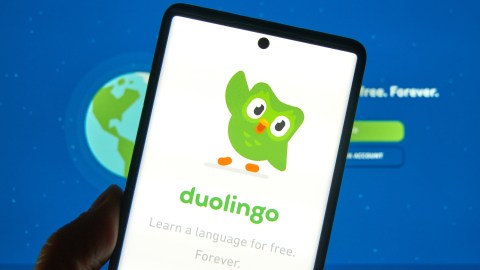Duolingo is probably a better Alzheimer’s treatment than the newest breakthrough drug

- A phase 3 clinical trial focusing on people diagnosed with early Alzheimer’s disease showed that the drug lecanemab slowed declines in memory and thinking by 27% over 18 months.
- Studies suggest that being bilingual could delay the onset of Alzheimer’s symptoms by five years on average, making free language-learning apps like Duolingo a superior alternative to pricey new medications.
- Importantly, the studies show that proficiency with a second language matters more than when it was learned, meaning that learning a new language at any age likely protects against Alzheimer’s symptoms.
Late last year, a phase 3 clinical trial was published in the New England Journal of Medicine to wide acclaim. The 1,800-person, 18-month-long study centered around patients in the early stages of Alzheimer’s disease. It showed that a monoclonal antibody called lecanemab slowed declines in memory and thinking by 27%, a modest yet tangibly positive result. Despite lecanemab’s notable side effects, which included brain swelling in 12% of patients and brain bleeding in 17%, experts say it represents the most significant pharmaceutical advance against Alzheimer’s disease in decades.
The FDA granted accelerated approval for the drug, now known as Leqembi, earlier this month. Pharmaceutical giants Eisai and Biogen set its price at $26,500 per year soon thereafter. Anywhere from two to five million Americans could be eligible for Leqembi, which is given as an intravenous injection every two weeks.
While Leqembi constitutes a solid medicinal tool against Alzheimer’s disease, bringing hope to millions of sufferers and their families, there exists a free “treatment” option which studies hint could be far more effective: Duolingo.
Bilingualism delays Alzheimer’s
Alright, to be clear, no research has yet tested whether use of the popular, free language-learning app actually treats Alzheimer’s disease. However, a bounty of published studies has shown that speaking two languages is remarkably protective against it, delaying the onset of symptoms by five years on average, firmly trouncing Leqembi’s pricey benefits.
John Grundy, an assistant professor of psychology at Iowa State University, reviewed and analyzed all the available evidence on the topic in 2020. “Bilinguals and monolinguals eventually show the same number of Alzheimer’s disease cases, but bilinguals tend to be able to stave off those symptoms for longer,” he said in a statement. “Maybe the most surprising thing… is the consistency of the effect. It’s a very robust finding.”
Most researchers think that bilingualism builds up something called cognitive reserve, the mind and brain’s resilience to damage. Learning a new language creates additional networks of neural connections in areas of the brain that also manage working memory, emotional regulation, and self-control. Moreover, it seems that bilinguals tend to recruit additional parts of the brain for more efficient processing of information than monolinguals.
To paraphrase, bilingual brains seem to be better connected and more diversified, making them less susceptible to Alzheimer’s spread and its accompanying crippling symptoms, including confusion, forgetfulness, and delusion. Importantly, the studies show that proficiency with a second language matters more than when the new language was learned, suggesting that learning a new language at any age likely protects against Alzheimer’s symptoms.
A daily dose of Duolingo
Starting a productive habit of language learning later in life with apps like Duolingo (or Babbel or Mondly or Rosetta Stone) can be as rewarding as it is mentally stimulating. Its potential to add years of cognitive acuity by delaying the onset of Alzheimer’s symptoms makes it all the more worthwhile.





